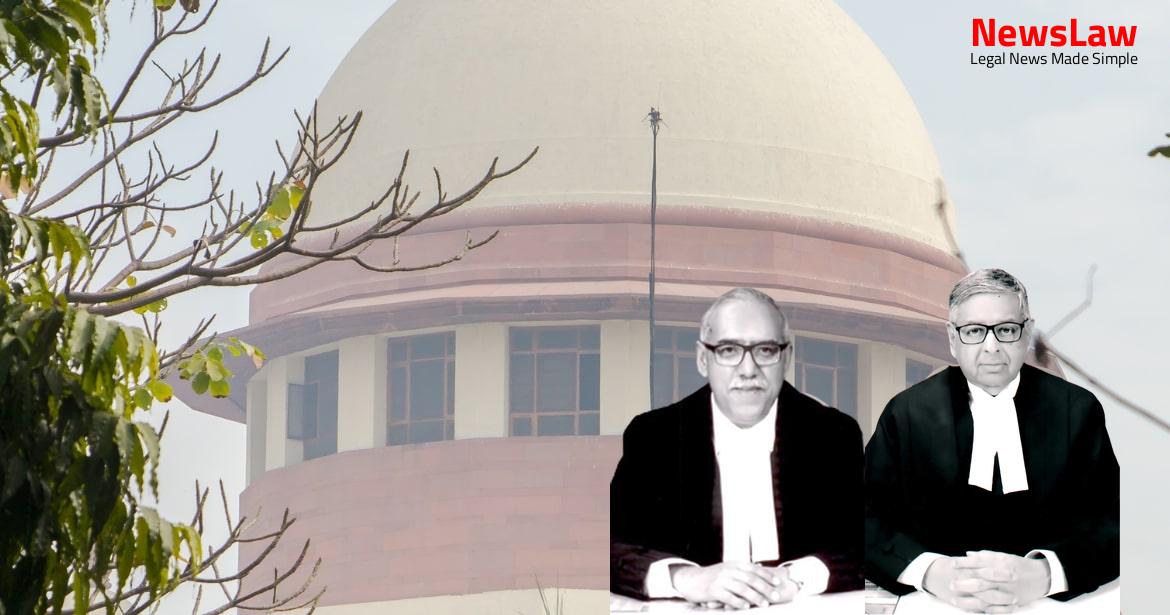Explore the in-depth legal analysis conducted by the High Court regarding the mandatory Ph.D. requirement for Principal positions in polytechnic colleges. The court delves into the interpretation of AICTE regulations, providing clarity on this contentious issue. Stay tuned to learn more about this significant legal debate.
Facts
- Respondent No. 1 filed a writ petition in the High Court alleging violation of fundamental rights due to the promotion process being contrary to the 2010 AICTE Regulations.
- He argued that the 2014 Chhattisgarh Rules allowing non-Ph.D. candidates to be appointed as Principals were illegal as per the 2010 AICTE Regulations.
- Respondent No. 1 claimed to meet the criteria for the position of Principal as he had the required HOD experience and no pending complaints.
- He applied for the position of Principal in 2014 along with other HODs, including the appellants.
- Appellants No. 1 to 7 were promoted without possessing a Ph.D., unlike Respondent No. 1 who was not selected.
- The High Court allowed Respondent No. 1’s petition, declaring Ph.D. as a mandatory qualification for the post of Principal, leading to the quashing of the appellants’ appointments.
- The appellants challenged this decision through the order dated 28.09.2016 of the High Court of Chhattisgarh.
- The High Court interpreted the AICTE criteria to require a Ph.D for appointment or promotion as ‘Principal’.
- The 2016 AICTE Notification clarified any ambiguity in the 2010 AICTE Regulations and was deemed retrospective.
- In response to a petition, the High Court quashed the incongruous parts of the 2014 Chhattisgarh Rules.
- Respondent No. 1 sought the review of promotion proceedings, including reconsideration for promotion from HOD to Principal.
- Appellant No. 1, who chaired the committee drafting the 2014 Chhattisgarh Rules, was deemed an interested party by the High Court.
- The High Court also noted an infirmity in the date of publication of the 2014 Chhattisgarh Rules and consequently quashed the promotion orders.
- The High Court emphasized the binding nature of the 2010 AICTE Regulations and held that the State Government could not lower the qualification threshold based on a precedent involving the State of Kerala.
Also Read: Legal Analysis on Arbitration Petition Limitation Period
Issue
- The key issue at hand is whether the 2010 AICTE Regulations mandate candidates to hold a Ph.D. for the position of Principal.
- This issue has sparked controversy and requires clarification.
Also Read: Analysis of High Courts’ Jurisdiction and Court Orders Under Article 142
Arguments
- The appellants argue that there was no ambiguity in the 2010 AICTE Regulations, which should govern the eligibility criteria for the posts of Principal in polytechnic colleges.
- They highlight that making a Ph.D degree mandatory for Principal positions in Chhattisgarh polytechnic colleges would leave seven out of nine positions vacant.
- The appellants assert that any interpretation making Ph.D mandatory should only apply prospectively, not retrospectively, in line with AICTE regulations.
- They point out that the restriction on Ph.D specifically in ‘Engineering’ conflicts with the broader ‘experience’ criteria set by AICTE, limiting the pool of eligible candidates for Principal positions.
- The appellants argue that the 2014 Chhattisgarh Rules relaxing the mandatory Ph.D requirement were ultra vires as they contradicted the AICTE Regulations.
- They claim that Respondent No 1, having participated in the promotion process, cannot challenge the validity of the selection process or rules now.
- Respondent No 1 argues that AICTE, as a statutory body, has supremacy over setting standards for technical education.
- Respondent No 3 (AICTE) clarifies that their case is not about removing candidates already promoted to Principal positions without a Ph.D.
- The AICTE Act of 1987 empowers AICTE to regulate technical education standards and institutions, and its regulations have the force of law.
- The AICTE Act explicitly establishes an Expert Body to regulate technical education standards and institution establishment.
Also Read: Electoral Malpractices in Mayor Election
Analysis
- The 2016 AICTE Notification is considered merely declaratory or clarificatory, reiterating the existing position of law from the 2010 AICTE Regulations.
- The eligibility conditions for the posts of Principal were already clear in the 2010 AICTE Regulations, making any retrospective changes unnecessary.
- Appointments made based on a possible understanding of the eligibility conditions should not be affected by later clarifications.
- The principle that appointments made according to existing rules should not be unsettled due to later interpretations or clarifications is highlighted.
- Clarificatory regulations should be clearly stated in the statute and not used to change existing laws retroactively.
- Ph.D is not mandatory for the Head of Department (HOD) position but offers a 5-year relaxation in work experience.
- The 2016 AICTE Notification was a response to public doubts and aimed to simplify existing regulations without altering the law.
- The High Court’s interpretation regarding the necessity of a Ph.D for Principals under Issue No. 64 is questioned, as it might conflict with the existing rules.
- The 2016 AICTE Notification is analyzed for its impact on eligibility conditions and the necessity for retrospective changes, emphasizing the importance of clarity in regulations.
- A rule that applies to future rights of individuals already in service is not considered retroactive and does not violate Articles 14 and 16 of the Constitution.
- However, a rule that reverses a previously granted benefit, such as promotion or pay scale, from an earlier date can be challenged for being retroactive and violating Articles 14 and 16 of the Constitution.
- Various court decisions have emphasized the importance of distinguishing between ‘vested rights’ or ‘accrued rights’ in determining the validity of rules in service matters.
- In this case, the appellant held a position that allowed him to influence the rule-making authority under Proviso to Article 309 of the Constitution.
- It was argued that his position was too small to infer dominance in the decision-making process.
- The court found that the appellant’s position did not grant him significant influence over the decision-making process.
- Therefore, it was concluded that no inference of his dominance in the decision-making process could be drawn from his position.
Decision
- The judgment of the High Court is set aside
- The writ petition filed by Respondent No 1 challenging the promotion of appellants is dismissed
- Dismissal of the writ petition is without any order as to costs
Case Title: GELUS RAM SAHU Vs. DR. SURENDRA KUMAR SINGH (2020 INSC 202)
Case Number: C.A. No.-001667-001667 / 2020



